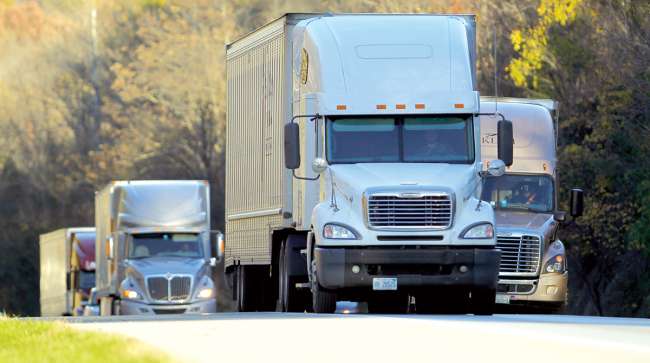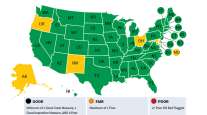Senior Reporter
FMCSA Proposes 2020, 2021 Reductions to Commercial Vehicle Registration Fees

[Stay on top of transportation news: Get TTNews in your inbox.]
The Federal Motor Carrier Safety Administration has issued a proposed rule that would continue to reduce commercial vehicle registration fees in 2020 and 2021, the agency said in a Federal Register announcement on Aug. 27.
In its proposal, FMCSA said it plans to reduce the annual registration fees collected by states for motor carriers, private motor carriers of property, brokers, freight forwarders and leasing companies by 12.82% in 2020 and 4.19% in 2021 when compared with 2018 rates.
However, the vice chairman of the board of directors of Unified Carrier Registration, which collects fees and makes recommendations about the rates, says the group is expected at its meeting Sept. 5 to propose cutting the rates by an additional 1% to 2% below FMCSA’s proposal.
The rates are graduated based on the number of trucks a carrier has in its fleet. For instance, carriers with up to two trucks paid $69 in 2018 and $62 in 2019. Under the FMCSA proposal, in 2020 the same carrier would only pay $60, but would pay $66 in 2021.
For a carrier with a fleet of 1,001 or more trucks, the proposed fee would be $58,060 in 2020, down from $59,689 in 2019. However, in 2021 the cost would rise to $63,809, according to the FMCSA proposal.
UCR by Transport Topics on Scribd
“The fees are calculated according to collections of the second year prior, and collections for 2018 registrations are still coming in,” Robert Pitcher, vice chairman of the UCR board of directors, told Transport Topics.
Revenue collected is allocated to the participating states and the plan. In accordance with federal law, fee adjustments must be requested by the board when annual revenue exceeds the maximum allowed.
Currently the board estimates that by Dec. 31, total revenue will exceed the statutory maximum for the 2018 registration year by approximately $3.08 million. In addition, the board determined that excess funds were collected for both the 2015 and 2016 registration years.
If there are excess funds after payments to the states and for administrative costs, they are retained in the board’s depository and subsequent fees must be reduced as required.
The board’s recommendation reduces fees based on collections over the statutory cap in 2018, and includes a reduction in the amount of the administrative cost allowance from $3.5 million to $3.2 million for the 2020 and 2021 UCR Agreement registration years. The board completed an analysis estimating the amount of administrative cost allowance needed for the 2020 and 2021 registration period and has determined that an allowance of $3.2 million will be needed each year for those registration years. The agency reviewed the board’s formal recommendation and concluded that its projection of the total revenue received for registration year 2018 is acceptable.




